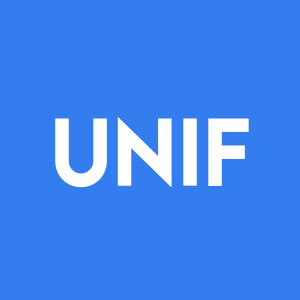Welcome to our dedicated page for U & I Financial news (Ticker: UNIF), a resource for investors and traders seeking the latest updates and insights on U & I Financial stock.
U & I Financial Corp. (UNIF) provides banking services through UniBank, specializing in government-backed loans and commercial lending for small businesses. This page aggregates official news and press releases to help stakeholders track the company’s financial developments, risk management strategies, and market positioning.
Access timely updates on earnings reports, regulatory compliance changes, loan portfolio adjustments, and technology investments. Key focus areas include credit quality trends in commercial equipment financing, updates to government guaranteed loan programs, and capital management practices.
This resource serves investors seeking to monitor UNIF’s risk-adjusted performance, analysts evaluating regional banking trends, and businesses exploring specialized lending options. All content is sourced from verified company communications to ensure accuracy and relevance.
Bookmark this page for streamlined access to UNIF’s latest strategic initiatives and financial disclosures. Check back regularly for updates on community banking developments and regulatory compliance milestones.
U & I Financial Corp. (OTCQX:UNIF) reported significant losses in Q4 2024, with a net loss of $16.6 million ($3.02 per share) compared to $18.2 million loss in Q4 2023. The full-year 2024 resulted in a net loss of $31.1 million ($5.67 per share), substantially higher than 2023's loss of $10.8 million.
The company faced major challenges with deteriorating commercial-equipment loans, charging off $18.1 million in Q4 2024. Total assets decreased by 14.4% to $522.3 million, net loans fell 16.9% to $386.1 million, and deposits dropped 14.5% to $439.6 million compared to December 2023.
The bank's capital ratios as of December 2024 were: Tier 1 Leverage Ratio at 5.60%, Tier 1 Risk-Based Capital Ratio at 7.53%, and Total Risk-Based Capital Ratio at 8.80%, maintaining 'adequately capitalized' status per regulatory guidelines.
U & I Financial Corp (OTCQX:UNIF) has amended its Q3 2024 financial results, reporting significant changes in key metrics. The restatement shows decreases of $8.7 million each in Gross Loans and Allowance for Credit Losses (ACL) on Loans due to commercial equipment loan charge-offs. While the restatement had no impact on earnings, it led to notable changes: ACL to Loans ratio dropped from 6.59% to 4.70%, Net Credit Charge-Offs doubled to $17.4 million for the quarter, and Nonperforming Assets to Total Assets ratio improved from 2.74% to 1.23%. Capital ratios also decreased slightly, with Tier 1 Leverage Ratio falling from 7.53% to 7.22%.
U & I Financial Corp. (UNIF) reported a significant quarterly Net Loss of $15.0 million ($2.73 per share) in Q3 2024, compared to Net Income of $2.4 million in Q3 2023. The loss primarily stems from a $19.5 million Provision for Credit Losses. Total Assets decreased 7.0% to $569.6 million, Net Loans fell 14.0% to $410.3 million, and Total Deposits declined 10.3% to $468.2 million year-over-year. The bank faced credit deterioration in commercial-equipment loans, which totaled $38.3 million. Despite challenges, capital ratios remain above regulatory 'well capitalized' minimums.
U & I Financial Corp. (OTCQX:UNIF), the holding company of UniBank, has announced two key executive appointments effective September 1, 2024. Robert Disotell joins as Executive Vice President (EVP) and Chief Credit Officer (CCO), bringing 21 years of experience as a Chief Credit/Lending Officer in Washington and California. Additionally, JJ Kim has been appointed as EVP and Chief Banking Officer, overseeing branch network and loan originations.
Disotell's extensive background includes roles at California Coast Credit Union and Cascade Bank, with 35 years of experience in the Puget Sound market. Kim brings 23 years of experience in Puget Sound banking markets, having held senior positions at GBC International, Bank of Hope, and Heritage Bank.
These strategic appointments aim to strengthen UniBank's leadership and enhance its lending operations and community service.
U & I Financial Corp. has reported a net loss of $827 thousand or $0.15 per share for Q2 2024, a significant decrease compared to a net income of $2.4 million or $0.44 per share in the same period last year.
The decline is primarily due to a $3.0 million increase in Provision for Credit Losses in Q2 2024. Other key metrics include:
- Total Assets: $572.6 million, down 5.7% from the previous year.
- Net Loans: $441.5 million, down 8.4%.
- Total Deposits: $451.9 million, a 12.6% decrease.
- Allowance for Credit Losses (ACL) on Loans: $17.7 million as of June 30, 2024.
- ACL on Off-Balance Sheet Credit Exposure: $2.2 million.
The financial decline stems from ongoing challenges with commercial-equipment loans, necessitating increased reserves and impacting overall credit quality.
U & I Financial Corp (OTCQX:UNIF), the holding company of UniBank, has announced significant leadership changes. Stephanie Yoon has been appointed as the permanent Chief Executive Officer of both the Company and Bank, effective July 16, 2024. Yoon, a 13-year veteran of the Bank with 30 years of banking experience, has been serving as Interim CEO since February 2024.
The company has also added two new directors: Ken Johnson, former Executive VP of Banner Bank, and Scott Strand, former Executive VP and COO of Boeing Employees Credit Union. Additionally, Ellis Chang, a director since 2021, has been appointed as chair of the Boards.
U & I Financial Corp. reported a decrease in net income for the first quarter of 2024 compared to the same period in 2023 primarily due to less net interest income. The company turned positive after a significant restated net loss in the previous quarter. Total assets increased slightly, while net loans decreased, and total deposits saw a notable decrease. The company also faced challenges with a lawsuit from borrowers of commercial-equipment loans. The Bank remains well-capitalized and has sufficient liquidity.

